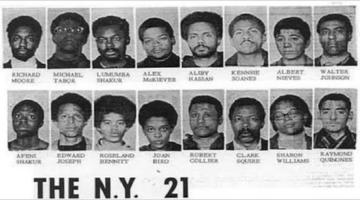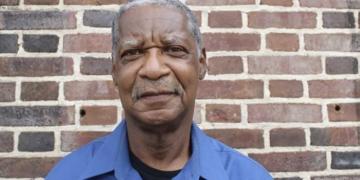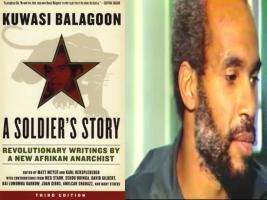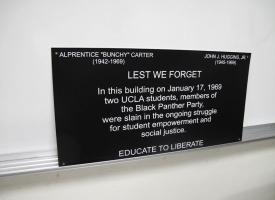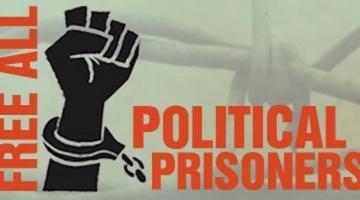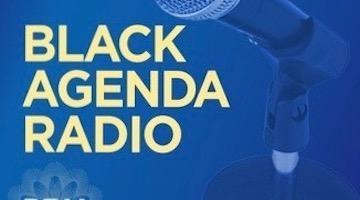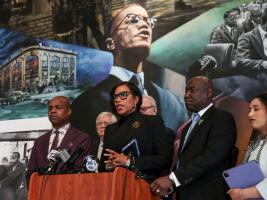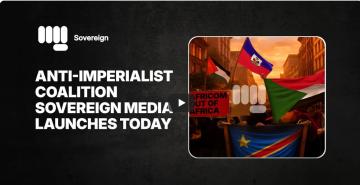Hollywood is big, mostly white, capitalist business, so it’s no surprise that its new film on Fred Hampton provides little information on Black Panther politics and history.
“The only police patrol featured in the film involved a Panther killing police.”
These are amended remarks from a reaction video published by this writer to Judas and the Black Messiah shortly after the film’s release on February 12th, 2021.
A movie that centers a political giant such as Fred Hampton is inevitably going to generate a kind of public and political discussion that is wholly anathema to the Hollywood corporate environment. The masses of people, especially young Black Americans and activists of all races rallying under the banner Black Lives Matter, are hungry for political education. Unfortunately, Judas and the Black Messiah is largely devoid of the most critical political content that characterized Fred Hampton and the Black Panther Party.
Of course, the definition of political content is itself subject to political struggle. A new wave of interest in the Black movement has produced an urgency among cultural artists to retell the story of the Black Panther Party. Yet culture under capitalism must appease the ruling class in the final analysis, and that is what Judas and the Black Messiah ultimately achieved. However, unlike Stanley Nelson’s extremely negative portrayal of the Black Panther Party in Vanguard of the Revolution or Beyonce’s extreme commodification of the Black Panther Party during her Super Bowl performance in 2016. Judas and the Black Messiah presents more subtle political problems.
“Culture under capitalism must appease the ruling class in the final analysis,”
The biggest problem with the film is the absence of the historical context that brought the Black Panther Party and Fred Hampton into being. Beyond short scenes of Hampton’s speeches, there is very little coverage of Hampton or the Black Panther Party’s socialist and internationalist political ideology. There are brief references to Hampton’s solidarity with national liberation movements in Mozambique and Vietnam. But the work of Fred Hampton and the Black Panther Party, from its Free Breakfast Program to its leadership in the peace movement movement, was given scant attention in place of a disproportionate focus on the torn consciousness of FBI informant William O’Neal.
To the film’s credit, when Fred Hampton is the focus, he and his comrades are portrayed as human beings with profound leadership qualities and a deep devotion to the people. But there is a cost to humanization when it comes to Hollywood’s corporate imperatives. That is, Hampton and the Panthers are not the only forces in the film to receive human-like qualities. So too did FBI agent Roy Mitchell. Mitchell is portrayed as a Civil Rights-supporting liberal who disagrees with J. Edgar Hoover’s brutal methods for neutralizing Fred Hampton. Again, to the film’s credit, Mitchell did not occupy the role of white savior as so often is the case in Hollywood
“The work of Fred Hampton and the Black Panther Party is given scant attention.”
Still, some of the impulse to humanize the Black Panther Party led to historical distortions such as the film’s depiction of the murder of Jake Winters by Chicago police. Winters is portrayed as a rogue Panther who, angered by the police murder of a comrade in the hospital, engages in a random shootout with police officers. The story told by the Illinois Black Panther Party at the time was entirely different. Winters was killed in an ambush by Chicago Police just weeks before Fred Hampton’s assassination. The shoot-out did indeed lead to two slain police officers, but the film portrays Winters’ actions as an example of the Black Panther Party “doing some bad” alongside the “good” rather than an act of self-defense from what at the time were regular police raids on the Panther office AND Black American homes.
And while the FBI is rightfully cast as an agent of repression obsessed with destroying Fred Hampton, the historical context of why the FBI was so obsessed with the elimination of the Black Panther Party was marginal at best and non-existent at worst. The Black Panther Party was labeled the greatest threat to the internal security of the United States for a variety of reasons. For one, the Black Panther Party espoused revolutionary ideology as its guide for Black liberation in the United States and linked its struggle to the liberation of the colonized and oppressed abroad. Revolutionary socialism was the framework from which the Black Panther Party conducted political education, organized community programs, and developed relations with oppressed nations abroad.
“Why the FBI was so obsessed with the elimination of the Black Panther Party was marginal at best and non-existent at worst.”
None of the Black Panther Party’s activities occurred in a vacuum. Much of the underdeveloped and colonized world at the time was engaged in a struggle for liberation against the United States and its imperialist allies. Furthermore, decades of Black political struggle culminated in massive rebellions in cities across the country. The violence of police occupation and poverty were regular features of Black American life. These conditions were critical to the formation of the Black Panther Party and Fred Hampton’s leadership but were largely missing from the film. The only police patrol featured in the film involved a Panther killing police. It was in these instances when the U.S. establishment’s obsession with Black death and the portrayal of the Black Panther Party as a “cop killing” organization was clearest in the film.
The usefulness of art such as Judas in the Black Messiah is that it generally leads to more questions than answers. Enormous questions remain that cultural workers, whether they are filmmakers, journalists, and artists of all kinds, must attempt to answer. Why and how did the Black Panther Party form? What kind of lessons does the organization offer to a new generation of activists and organizers facing a declining empire built on the foundations of racism, capitalism, and endless war? Luckily, Fred Hampton himself left a wealth of material that attempts to answer these exact questions. Two of his speeches explaining the politics, ideology, and activities of the Black Panther Party can be found here and here.
Danny Haiphong is a contributing editor to Black Agenda Report and co-author of the book “American Exceptionalism and American Innocence: A People's History of Fake News- From the Revolutionary War to the War on Terror.” Follow his work on Twitter @SpiritofHo and on YouTube as co-host with Margaret Kimberley of Black Agenda Report Present's: The Left Lens. You can support Danny at www.patreon.com/dannyhaiphong


